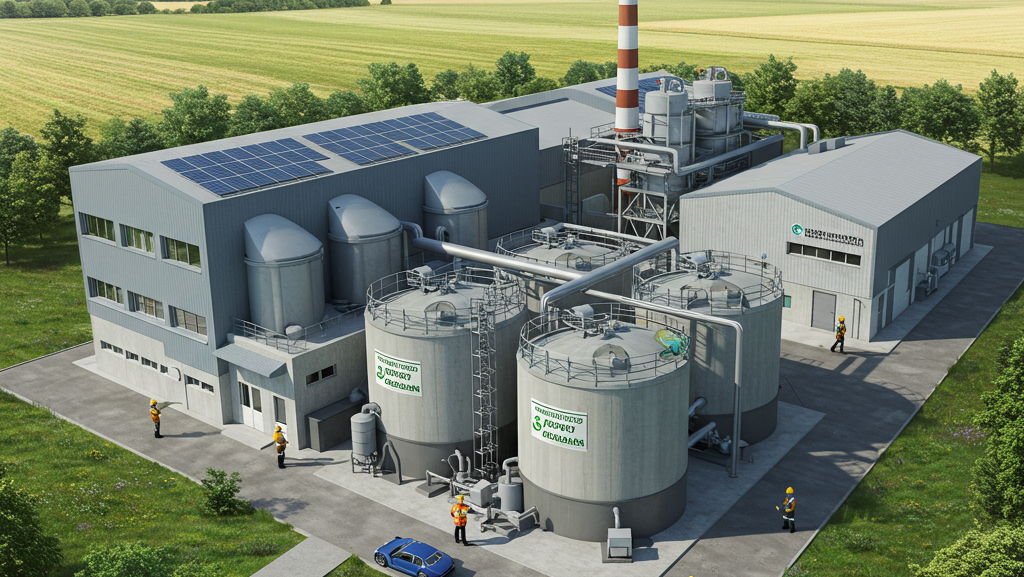Mupundu Energy and Anaerobic Digestion Technology
Mupundu Energy is at the forefront of renewable energy innovations in Zambia, particularly through its pioneering use of anaerobic digestion (AD) technology. This method plays a crucial role in transforming agricultural and livestock waste into biogas, a sustainable energy source that can significantly impact the energy landscape of Zambia. The process of anaerobic digestion involves the breakdown of organic matter by microorganisms in an oxygen-free environment, resulting in the production of biogas primarily composed of methane. This biogas can be harnessed to generate electricity, addressing the prevalent energy shortages faced by the country.
The company’s inaugural project aims to deliver 2.5 MW of renewable energy through AD technology, marking a significant step towards achieving energy sustainability in Zambia. By efficiently converting waste into energy, Mupundu Energy not only promises a reliable source of electricity but also enhances environmental conservation efforts. The utilization of waste for energy aligns with the global shift towards renewable energy solutions, as it reduces reliance on fossil fuels and minimizes greenhouse gas emissions.
Moreover, the implementation of anaerobic digestion contributes supplementary benefits to local communities. One of the most notable advantages is the provision of sustainable cooking fuel derived from biogas, which helps in reducing the dependency on wood or charcoal. This shift is vital in tackling deforestation issues present in Zambia, as it alleviates the pressure on local forests and promotes a healthier ecosystem. Furthermore, Mupundu Energy’s integration of AD technology in large-scale farming practices enhances agricultural productivity, providing farmers with a means to effectively manage waste while simultaneously contributing to energy generation.
In summary, Mupundu Energy’s investment in anaerobic digestion technology is not only a transformative approach to renewable energy generation but also an essential step towards fostering environmental sustainability and improving the livelihoods of local communities in Zambia.
Environmental Impacts of Mupundu Energy’s Initiatives
Mupundu Energy is making significant strides in transforming the renewable energy landscape in Zambia. Through the implementation of anaerobic digestion technology, the company is addressing pressing environmental challenges associated with traditional energy sources. One of the notable impacts of this innovative approach is the reduction of deforestation. By providing alternative energy sources, specifically biogas derived from organic waste, Mupundu Energy reduces the reliance on wood as a primary source of fuel. This shift helps preserve Zambia’s forests, which are essential for maintaining biodiversity, supporting wildlife habitats, and regulating local climate patterns.
Additionally, Mupundu Energy’s waste-to-energy conversion process plays a vital role in lowering greenhouse gas emissions. Anaerobic digestion captures methane, a potent greenhouse gas that would otherwise be released into the atmosphere through the decomposition of organic materials. By converting waste into biogas, Mupundu Energy effectively mitigates the environmental impact associated with landfill waste while generating a cleaner source of energy. This process not only contributes to sustainable development but also aligns with global efforts to combat climate change.
The benefits of Mupundu Energy’s initiatives extend beyond energy production. The by-product of the anaerobic digestion process, known as digestate, emerges as a nutrient-rich organic fertilizer. This digestate can be used to improve soil quality and fertility, promoting sustainable agricultural practices. Farmers utilizing this organic fertilizer can experience enhanced crop yields and healthier soils, which in turn can contribute to food security in the region. Furthermore, the adoption of organic fertilizers helps to conserve biodiversity by reducing the dependence on chemical fertilizers, which can harm local ecosystems.
Ultimately, Mupundu Energy’s commitment to renewable energy demonstrates how innovative technologies can lead to significant environmental benefits. Through the use of anaerobic digestion and sustainable agricultural practices, the company is not only addressing the energy needs of Zambia but also enhancing overall ecological health for future generations.
Economic and Social Benefits to Communities
The initiatives undertaken by Mupundu Energy in the realm of renewable energy are poised to bring substantial economic and social advantages to local communities in Zambia. One of the most significant outcomes of their projects is the creation of jobs. The construction, operation, and maintenance of Anaerobic Digestion (AD) facilities generate employment opportunities for local residents. This engagement not only contributes to the economic stability of households but also empowers individuals by providing them with technical skills and training. As the demand for skilled labor rises, communities can expect a decrease in unemployment rates and an enhancement of workers’ capabilities.
Moreover, Mupundu Energy’s focus on clean cooking fuels significantly impacts health outcomes. Traditional energy sources often lead to indoor air pollution, which poses serious health risks, particularly for women and children. By promoting biogas as a clean cooking alternative, Mupundu Energy facilitates a healthier living environment. The reduction in pollutants from burning biomass or coal decreases instances of respiratory diseases, thereby improving overall community health and productivity.
Another key advantage of these renewable energy initiatives is the financial savings they offer to households. Biogas systems present a cost-effective alternative to conventional energy sources such as charcoal and kerosene. As households transition to biogas, they benefit from reduced energy expenditures, freeing up financial resources for other essential needs. This transformation not only contributes to greater economic resilience but also enhances the quality of life for individuals in these communities.
Ultimately, Mupundu Energy is not solely advancing technological solutions; it is also enhancing the socio-economic framework of Zambia’s communities. The confluence of job creation, improved health, and financial savings illustrates how renewable energy projects can act as a vehicle for holistic community development.
Challenges and Future Prospects for Renewable Energy in Zambia
The journey towards a sustainable energy future in Zambia is replete with both challenges and opportunities. Mupundu Energy, a notable player in the renewable energy sector, has encountered several obstacles as it strives to establish a robust biogas production framework. A primary challenge has been the consistency of feedstock for digesters. This issue is critical, as fluctuations in the availability and quality of organic materials can directly impact the efficiency and output of biogas plants. Securing a reliable source of feedstock is imperative for the ongoing success of renewable energy initiatives.
Moreover, land acquisition poses another significant hurdle. The process of obtaining land for renewable energy projects often involves navigating complex legal and regulatory landscapes. It’s essential for Mupundu Energy to collaborate efficiently with governmental bodies and local communities to facilitate smoother land acquisition processes. Effective engagement can foster understanding and support among stakeholders, ultimately increasing the chances of project success.
Regulatory challenges also play a critical role in shaping the future of renewable energy in Zambia. The existing regulatory frameworks can sometimes be cumbersome, making it difficult for companies like Mupundu Energy to implement innovative technologies swiftly. Advocacy for streamlined processes is vital to encourage investments and accelerate the deployment of renewable energy projects.
Despite these challenges, Mupundu Energy has made remarkable strides. One noteworthy milestone is the recent approval of a feasibility study for a 2.5 MW biogas power plant, which symbolizes a substantial step forward. Additionally, partnerships with local farms have solidified their feedstock supply chain, potentially mitigating some of the challenges mentioned above. In conclusion, the outlook for renewable energy in Zambia remains optimistic, driven by Mupundu Energy’s proactive initiatives and strategic partnerships that lay the foundation for a sustainable energy future.





